Dear Customers, Suppliers and Friends!
Our office will be closed from February 14th to 22nd in observance of Chinese Lunar New Year. We will resume back to work on February 23rd, 2026.
WIRE PLATING EQUIPMENT
HOT-DIP ZINC-ALUMINUM WIRE COATING LINE
Difference in protective metal coatings
Zinc (ZN) — is the most common and traditional anti-corrosion metal coating. It is applied by immersing the sheet steel in a zinc melt, or by electroplating it. But the galvanic method (the method of applying the metal coating on the surface by electrolysis) does not give an opportunity to apply a sufficient zinc layer for good corrosion protection.
The higher the zinc content, the thicker its thickness on each side and the higher the corrosion protection.
Galfan (ZA) — zinc alloy containing from 4.5% to 6.2% aluminum. Due to aluminum, the alloy is characterized by higher corrosion resistance than that of a simple zinc coating.
Upon contact with the environment, aluminum oxidizes very quickly, forming an oxide film. The alumina film is chemically stable, does not deteriorate over time, and is an excellent protection for problematic (from the point of view of corrosion) places of the metal sheet: cutting edges and scratches on the coating surface. Due to the presence of aluminum, the development of corrosion under the polymer coating will develop much more slowly, the likelihood of peeling paint from the protective coating is reduced.
Aluzinc (AZ) — a melt containing 55% aluminum, 43.4% zinc, 1.6% silicon. The coating combines the high protective properties of aluminum and the protective properties of zinc. Compared with galvanizing, this type of protective metal coating gives a 3-6 times increase in the durability of the steel sheet.
Aluzinc reflects 75% of thermal radiation, and silicon additives increase the heat resistance of the alloy. The silicon content in this alloy increases the corrosion resistance and promotes particularly strong adhesion of the coating to the base, prevents the penetration of the oxidizing atmosphere into the metal, thereby creating a reliable protective barrier.
An important indicator of corrosion resistance is the time of destruction of the protective metal coating before rust on 5% of the surface when the test sample is placed in salt fog.
The rate of destruction of the protective coating in salt fog, respectively:
- Zinc - 10 hours/µm
- Galfan - 25 hours/µm
- Aluzinc - 100 hours/µm
(Low / High Carbon Wire, Ø1.50-8.00mm)
Zinc-Aluminum (Z-A) Coating Application Process
Low carbon steel wire (heat treatment + hot-dip Zinc-Aluminum alloy line)

Low / high carbon steel wire (no heat treatment + hot-dip Zinc-Aluminum alloy line)

TECHNOLOGICAL EQUIPMENT DESCRIPTION AND PARAMETERS
| Wire material | C1006, C1008 |
|---|---|
| Wire diameter | ø 1.50-4.00 mm |
| Representative diameter | ø 2.89 mm |
| Production speed | 130 mm × m/min |
| Wire rod quantity | 14 rods |
Wire Decoiler
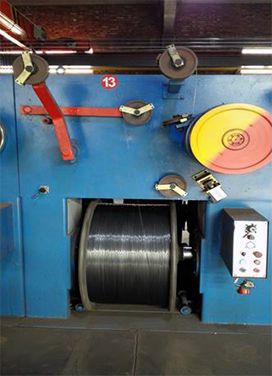
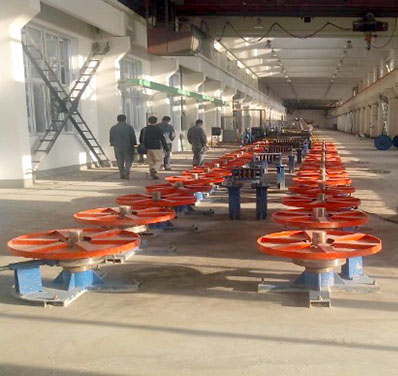
Decoiler: storage device with double coil (coil diameter: 500 mm), for 22 rods of wire.
Coil replacement is simple and easy to operate.
Decoiler devices are installed in a row, and the orientation of wire can be from right to left.
Heat Treatment Furnace for Wire
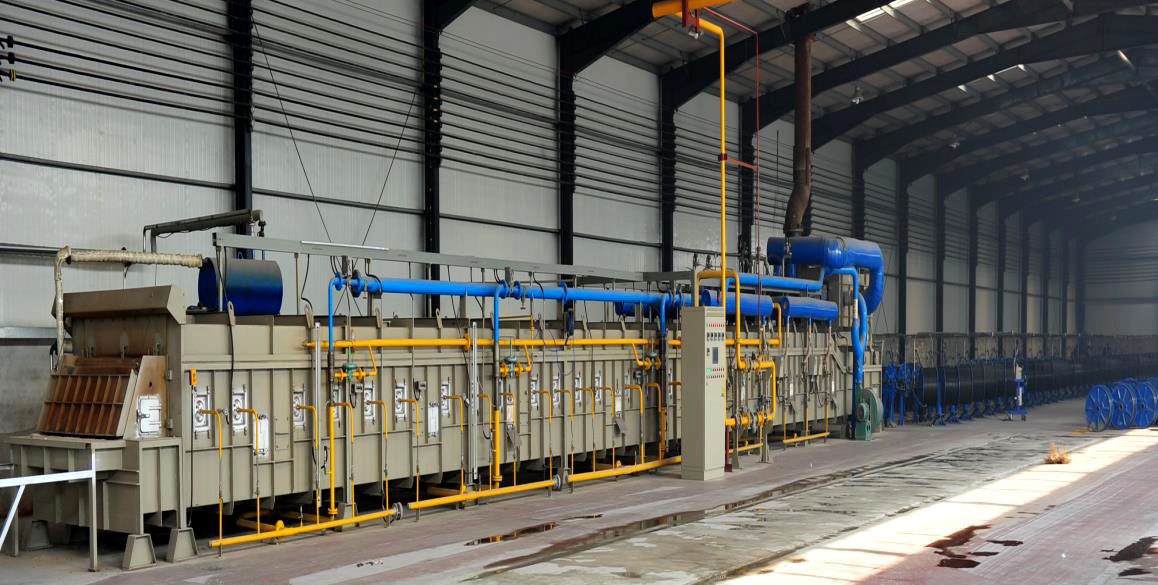
The main purposes of the heat treatment process for the wire are:
- improving the structure
- giving the metal strength
- giving the metal durability and other necessary properties
Heat treatment process usually includes the following steps:
- heating to a certain temperature
- maintaining that temperature for a certain amount of time
- cooling
Type of heating:
- natural gas (8500 × 4.18 kJ/m3)
- electricity four-wire three-phase 50Hz system
Annealing Furnace
Annealing furnace consists of the following components:
- 5 heating zones
- efficient burning system
- air supply system
- smoke removal system
There are several advantages of the Annealing Furnace:
- High heating efficiency
- Low maintenance
- Low gas consumption
- Low maintenance costs
The furnace is durable and has its own design, which allows to have a quick assembly and an easy further use. For isolation we use bricks which have strength grade 26 (ISOLITE JAPAN).
Surface Treatment Line
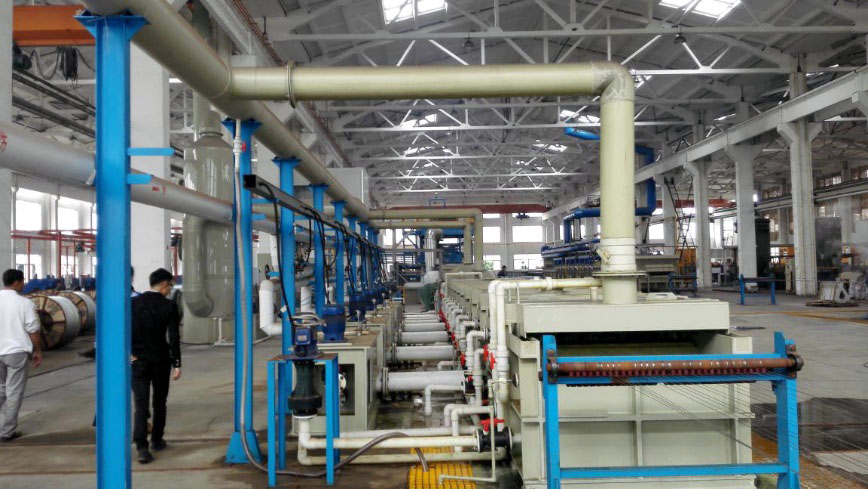
Parameters and Technical Requirements of the Production Line
| Wire material | 0.1-0.9% C |
|---|---|
| Wire diameter | ø 1.50 - 5.00 - 8.00 mm |
| Representative diameter | ø 3.2 mm |
| Production speed | 130 mm × m/min |
| Wire rod quantity | Total: 24 rods, two big lines in the middle, no-heat treatment |
| Nominal capacity | 3694,08 kg/h (ø 3,20mm) |
| Performance | 26597,37 t/year (7200 hours) |
Water and Air Cooling Bath
The bath is made of stainless steel SUS304, thickness 3 mm; bath length: 3 m; the frame is made of structural steel SUS304.
Wire washing – once; wiping – once; air blowing - once
Electrochemical Washing Bath
The bath is made of stainless steel SUS304; thickness 3 mm; bath length: 8 m; 4 leaching stages; type of electrolysis + - +, + - +, + - +, + - +
Wiping: once
Air blowing: once
Hot Water Washing Bath
The bath is made of stainless steel SUS304; thickness 3 mm; bath length: 8 m; the frame is made of structural steel SUS304.
Washing: once
Wiping: once
Air blowing: once
Pickling Bath
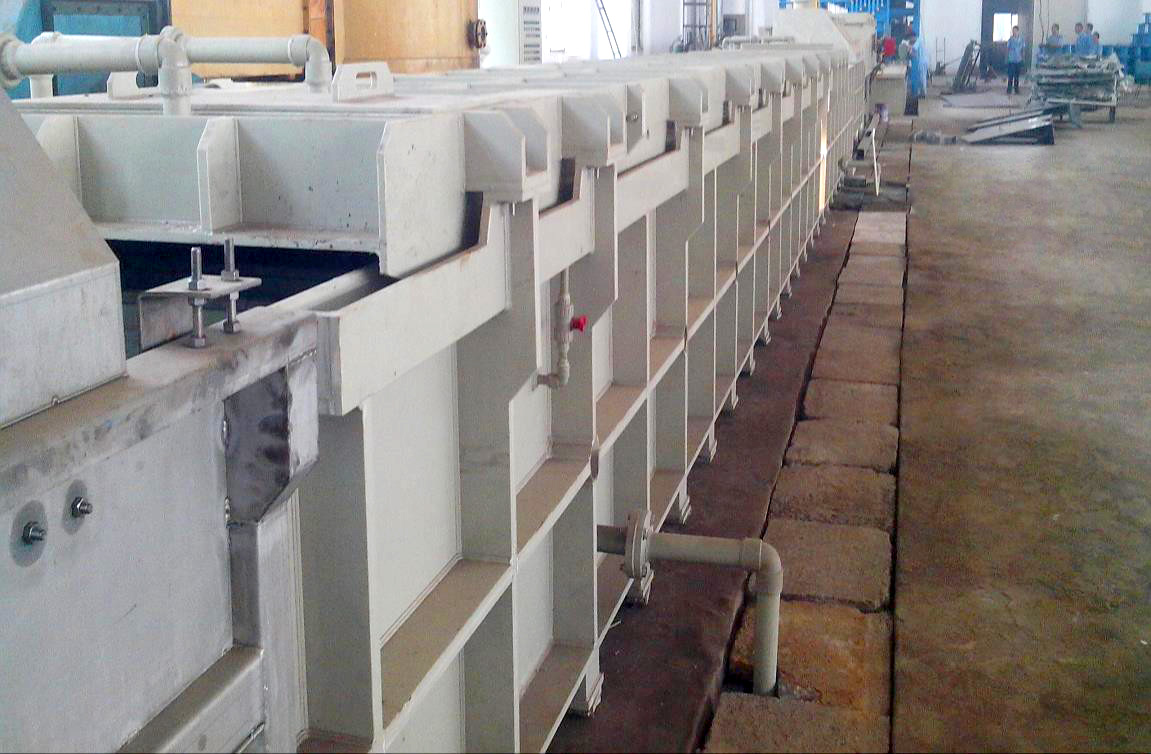
Bath length: 14 m
Pickling: 4 times
Three-stage washing bath
The bath is made of a copolymer of propylene and ethylene with a high content of polyethylene; bath length is 3 m. A circulation pump is used to spray and clean steel wire.
Hot-dip Z-A Coating Line Fluxing Bath
The bath is made of a copolymer of propylene and ethylene with a high content of polyethylene; bath length: 3.00 m
Fluxing: once
Hot-dip Z-A Coating Line Dryer
Made of steel plate Q235, thickness: 4 mm; frame made of structural steel Q235; length: 8 mm
Fluxing Bath
The bath is made of a copolymer of propylene and ethylene with a high content of polyethylene; bath length is 3 m.
Fluxing: once
Dryer
The dryer uses heated air to dry the wire. Made of steel plate type Q235; thickness 4 mm; frame made of structural steel Q235; length: 8.00 mm.
Hot-dip Galvanizing Furnace and Portal Frame
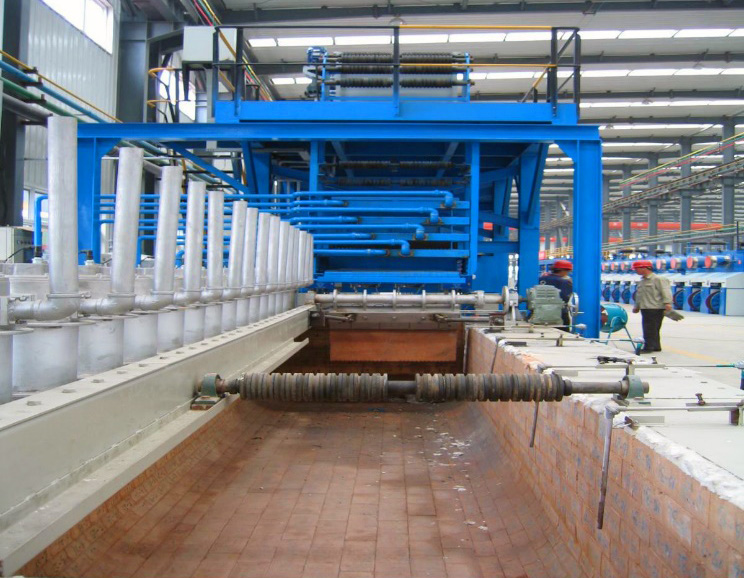
The galvanizing furnace is equipped with a zinc layer thickness monitoring system and a cooling system. There are 2 heating zones.
Zinc amount: 120 tons
Bath Material: Ceramics
The furnace and zinc temperature is controlled automatically; the ratio of gas and air is also adjusted automatically. Control sensors are located along the entire line.
The furnace is also equipped with a wax coating system. Water-soluble wax is used for wire coating to prevent corrosion and to lubricate the wire for further processes.
Wire Coiler
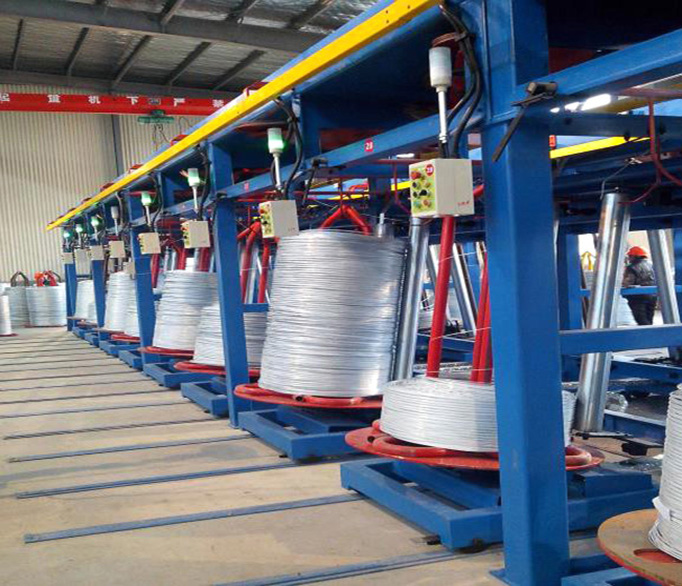
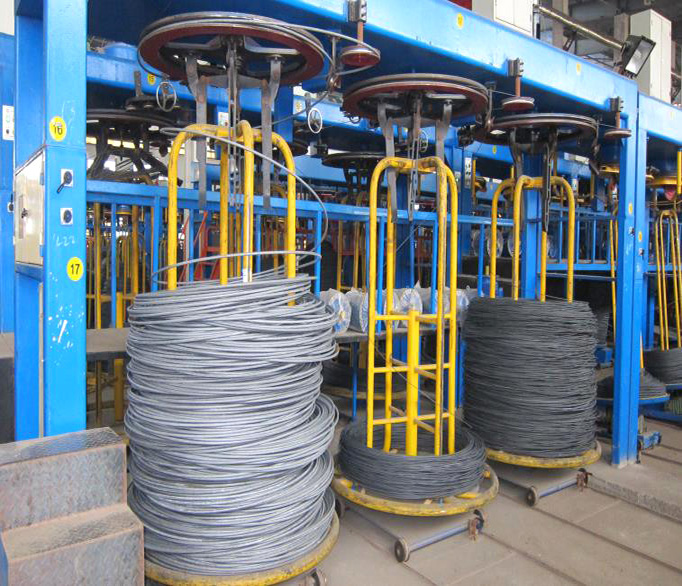
Wire coil specifications:
Internal diameter: 480 mm; outer diameter: 800 mm; wire coiler weight: 600 ~ 1000 kg
Wire coiler is equipped with a pneumatic tip for wire accumulation; trolley for wire transportation is placed on the ground; engine power – 0.55 kW

